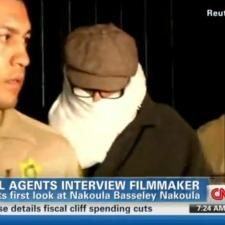BROOKE GLADSTONE: Devin Harner blogs for PBS’ MediaShift.org, where he wrote that major media organizations like the AP and Wall Street Journal were bamboozled by Sam Bacile, but they shouldn’t have been because a number of details in the initial reporting just didn’t pass muster.
DEVIN HARNER: Sam Bacile self-identifying as a Israeli American, the $5-million-dollar budget, and the quotes for me were problematic. My BS detector went off.
BROOKE GLADSTONE: Apparently, it was the line, “Islam is a cancer” which set those alarms ringing.
DEVIN HARNER: That feels like some kind of line from the eighties Cold War era movies. They’re just venomous. And I thought to myself, who in their right mind would own up to this, and are they credible?
BROOKE GLADSTONE: What did AP and the Wall Street Journal, which you single out, do wrong in this situation? Weren’t they just reporting on the information as it came in?
DEVIN HARNER: I tried to get the AP reporter to comment, and she wouldn’t speak to me. So I really don’t know. But, but my best guess, that they got turned on to the source by someone promoting the film, and the source just fed them this information that contributed a latently anti-Semitic narrative that was perpetuated. So the reporter reported the facts as she heard the facts, but as I teach my Introductory Journalism students, if somebody tells you a line of BS and you report that BS, you’re libel as well.
BROOKE GLADSTONE: There was a skeptical report that still recounted most of the information, quote, “known at the time” on the NPR blog that included the sentence, “The bottom line is that we know very little about Sam Bacile.” And you took exception to the use of the royal “we.”
DEVIN HARNER: When I click on that link and I realized that we don’t really know much, then I think to myself, well what’s the purpose of this link? There’s kind of this collective mindset on the part of reporters to say something. And I think that a deep breath, a moment to figure out if we know anything before we write would benefit everybody.
BROOKE GLADSTONE: You wrote that the unmasking of Bacile became a news event in its own right but that the mainstream media were collectively unable to admit that they’d been played.
DEVIN HARNER: This is a part of a bigger problem, the culture of breaking news reporting, where an update comes out and this is what we know now. The implication is that this supersedes what we knew then. But can you go to every person who read that first story and take away the erroneous facts that Sam Bacile was Israeli-American, that there were 100 Jewish donors and that the budget was $5 million? It’s a whole different world than it was in the old days of correction and retraction.
A lot of times I’m sitting at my computer at 1 o’clock in the morning and I’m on Google News, I’m after fact. I want something new. If I put myself in the shoes of all these people at their computers late at night, searching for news and wanting to find some kind of truth, and I think to myself that they deserve better than this.
BROOKE GLADSTONE: What they deserve that’s better is that reporters who have no good information should just shut up.
DEVIN HARNER: Not shut up but find some good information. I, I –[BROOKE LAUGHS]
You know, when I was a kid I was really into the band Talking Heads, and they had a song called “Psycho Killer,” and one of the verses was, “You’re talking a lot but you’re not saying anything.” That’s the kind of lyric that should be on your mind as a journalist: am I adding anything here to the discourse?
BROOKE GLADSTONE: Uh-uh-uh-uh, uh-uh, uh-uh-uh-uh…
DEVIN HARNER: Exactly.
BROOKE GLADSTONE: Uh-uh-uh-uh-uh.
DEVIN HARNER: Exactly.
[BROOKE LAUGHS]
There’s no news there.
[BROOKE LAUGHS]
It’s what he’s doing because he doesn’t have another verse. Think about the potential for these stories that are misreported to snowball via the Internet.
BROOKE GLADSTONE: You end your piece asserting that journalists who are constantly being asked to prove their worth aren’t much helping their situation.
DEVIN HARNER: It’s tough being a journalist in the digital age. You really don’t get paid to be quiet. Once they figure out they’ve been played, the reporters circled back around and they found out who this guy was and, and the updated story – there’s this beautiful little vignette where they go to this guy’s house and they say, “Are you Sam Bacile?” He says, “No, no, no, I’m not.” And they say, “Let me see your driver’s license.” And he shows the driver’s license, with his thumb over his middle name, which is suspiciously like Bacile. So this is the updated story after they got it wrong. And it’s beautiful. What I would have liked to have seen was Sam Bacile spoken to by phone, gives out this information and the BS detector goes off, and then they start doing the kind of thing, let me see your driver’s license, can you name some of your investors, and why on earth would you take responsibility for this film, knowing what happened to Rushdie with “The Satanic Verses” and knowing what happened to Theo Van Gogh? That’s the kind of stuff that they should have done before they broke it. But I think the trouble was they wanted a scoop and they wanted the hits. Who was Sam Bacile? That’s a beautiful story to break, if you actually know who he is. So they put the cart before the horse a little. There was good reporting. It was after the bad reporting.
BROOKE GLADSTONE: Devin, thank you very much.
DEVIN HARNER: Thank you.
BROOKE GLADSTONE: Devin Harner teaches journalism and literature at the City University of New York and blogs for PBS’ MediaShift.org.
[MUSIC UP AND UNDER]
